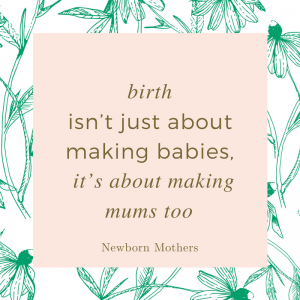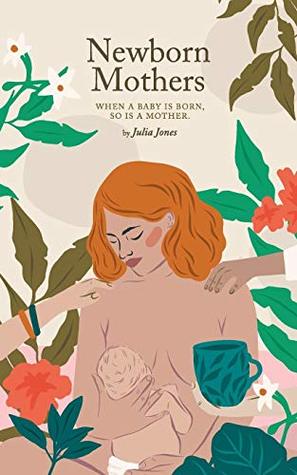This is a book review written by Doula Emma Goodin
“When a baby is born so is a mother”
The concept of newborn is well understood in society. Understood, in the sense of a newborn baby that is. But what is a Newborn Mother? A newborn, according to the Cambridge online dictionary is defined as “a child or animal that has recently been born.” So how can a mother also be newborn? Well, West Australian mother, author and postpartum doula, Julia Jones enlightens us on this very idea. Aptly titled Newborn Mothers, Julia’s book gives insight into a not so common definition of newborn. Insisting that mothers are newborn as well, her book describes mothers as being just as important as newborn babies.
Acting as a gentle guide that is beautifully written, Newborn Mothers is a holistic approach to postpartum and motherhood. It is a book for “mothers who want to take action on an individual level in their own lives.” (pg.2). Answering the questions about the often undervalued transformation of women into mothers, without being preachy or overly opinionated. Julia writes with gentle wisdom and calm understanding. She doesn’t pretend she is the expert and never tries to undermine your intuition or confidence. Mothers already deal with enough unwarranted advice on a daily basis. Instead, her book is a loving chat full of stories and peaceful wisdom. As you read, you feel warmly embraced by her wholesome style of writing, and you feel like the challenges are more manageable and even enjoyable. Julia encourages us to applaud motherhood, with all its twists and turns. It is not seen as something to survive. As a mother myself reading this book, I felt honoured and praised, rather than ridiculed or shamed, as many other parenting books have made me feel. Even more important than this, Julia’s book declares that mothers are not alone in their journey. That countless others, have felt exactly the same. She softly encourages women to trust their own bodies and their babies. After reading Newborn Mothers, you will be armed with some easy holistic steps to feel more at peace with who you are, or who you are becoming as a Newborn Mother.
As a mum of three, postpartum doula, educator and author of two books on postpartum care, it is safe to say that Julia knows motherhood. She especially has some wisdom to offer about the postpartum period. In fact, Julia insists that it isn’t just a period of time, as we have been led to believe. In fact, there is no time limit. Mothers do not stop being mothers. Therefore, the postpartum “period” is endless. The public view of postpartum is often negatively perceived. Instead of emphasising on the physical and mental ‘recovery’ post-birth, Julia’s book urges us to rethink the idea of as more of a celebratory journey. Mothers are growing and developing as much as their babies, and they need just as much attention and nurturing as well.
Newborn Mothers is a quick and easy read. The format in uncomplicated and there isn’t too much “expert” jargon to wrap your head around. All in all, the perfect book for mothers. She understands that mothers, no matter what stage they are in, whether it be pregnancy, toddlerhood or teenage-hood, are time poor creatures. The book is broken into 10 succinct chapters that outline holistic ways to support a mother’s postpartum journey, so that she doesn’t feel neglected and undervalued.

A truly healthy baby means a truly healthy mother. I say truly, because there is a misconception that health is just physical. True health is built from a wall of many different bricks. Newborn Mothers focuses on ensuring a mother stays healthy in mind, body and soul, so that she can care for her child or children in the best way possible.
The first chapter is all about the brain. This chapter is fascinating and helps mums feel like there is a reason behind some of the weird and wonderful things motherhood reveals. I personally had a light bulb moment when reading this chapter. Often coined by society as “baby brain”, Julia rejects this degrading and often comical definition of motherhood. The book insists that a Newborn Mother’s brain should be celebrated and honoured instead. Just like a baby’s brain has to grow, mature and develop, so too does a mums. And this development isn’t as negative as we have been led to believe. Yes, there are some not so pleasant changes that occur, such as marginal memory loss, but the book instead brings attention to the not so socially recognised traits of a mother’s brain – increased learning (neuroplasticity) and increased ability to love.
The book delves into the research of neuroscientist Marian Diamond during the 1970’s. She discovered that, rather than being a burden or a weakness, pregnancy is actually an enrichment of the brain – “stimulating it and leading to a thicker cerebral cortex” (pg.15). Fast forward 40 years after these findings, and MRI scans are detecting with “100% accuracy if a woman has been pregnant” (pg.16) in her lifetime. What an eye opening discovery that is! So despite the common public perception that being pregnant means you become the epitome of a crazy, hormonal, forgetful, emotional woman, research has found that you acquire a brain that actually increases in growth and development. Yes, you heard that right. A mother’s brain actually gets smarter! So when someone laughs or blames “baby brain” on certain things during your pregnancy, you can laugh right back at them, knowing full well that your brain has and continues to do some truly incredible things. It’s okay, they can’t help that they don’t have a mum brain.
In the chapters about Learning and Love, Julia goes into more detail about the motherhood brain. In Learning she discusses the neuroplasticity of a Newborn Mothers brain – namely the “adaptive ability of the brain to form and reorganise in response to an environment” (pg.20). It is well known that mothers are epic multi-taskers and highly adaptable. Who else can simultaneously feed a toddler, whilst also breastfeeding a newborn, whilst also feeding herself, whilst also cooking dinner for her husband. And let’s not forget that that same mother has probably emptied the dishwasher, checked her work emails, planned tomorrows lunches, done a load of washing and thought about her children’s future. How beautifully prepared and adaptable mother’s brains are for “this period of intense learning” (pg.20).
There is, however, a problem that women encounter in the modern world. Julia explains that today’s informational age and overly masculine way of learning is having a huge impact on Newborn Mothers and their brains. Mothers are instead relying on things like Google to answer their motherhood questions. They have become overloaded and even pressured “with task orientated, mathematical and rational solutions” (pg.23). How many times have you asked Google “how many hours should my baby sleep?” or “what should my baby’s poo look like?” or even better yet “how to be a good mother?”. I know I’m guilty of it. Google doesn’t know you, but your brain does. Motherhood is a learning process.
Naomi Stadlen, author of What Mothers Do – Especially When It Looks Like Nothing declares that “a mother needs to feel safe enough to risk feeling uncertain… A mother needs time to ‘grow’ into parenthood.” (pg.26). Mothers should stop questioning or doubting themselves and instead Julia invites them to rely on their instincts and make mistakes. She asks women that “maybe it’s time to try a more feminine way of learning?” (pg.21).

In her chapter about Love, Julia looks into the power of the love hormone – Oxytocin. Along with an increased neuroplasticity, a Newborn Mother’s brain “prepares you to fall in love” (pg.30). And we aren’t just talking about a little crush here. Aptly described as “nature’s nectar” (pg.34) Newborn Mothers offers ways to harness this amazing hormone and ensure it isn’t sabotaged. Some oxytocin examples include, simulating childbirth, expelling the placenta, helping prevent postpartum haemorrhage, initiating lactation, increasing bond with partner and baby, decreasing sensitivity to stress and pain, lowering blood pressure and increasing ability to read social ques – in general it is the hormonal key to “peace and joy in motherhood” (pg. 34). But Julia also explains that mothers need to be aware of some common oxytocin barriers. Feeling socially isolated or alone, being sleep deprived, having poor health, feeling uncomfortable in foreign environments, experiencing high stress or anxiety, and sometimes even having a caesarean section or not breastfeeding, may have huge implications on the amount of oxytocin released in the body. Simple things you can do to avoid and counteract these barriers, include loving touch (massage), comfort food, warmth, support, connection, proper rest and regular activity. Basically looking after yourself (your body and your brain) means you can successfully look after your baby.
In other chapters of her book, Julia lightly touches on gender roles, parental responsibilities and other positive changes that motherhood brings. Qualities such as increased senses (smell, perception, sound and touch), boosted efficiency and resilience, high amounts of ambition and a more regulated emotional intelligence. Consistently, the book endorses the idea that women and mothers are not broken. There is a myth known as the obstetric dilemma, that women’s bodies are faulty as they cannot carry an infant past 40 weeks’ gestation or the assumption that their hips are “too small to birth” (pg. 57). Again, Julia encourages us to rethink and see this as a positive thing, reassuring us that our babies are born at just the right time and that “our bodies are not broken” (pg. 58). That maybe babies are born when they are, so that they can experience crucial social and cultural stimuli suited to their brains developmental age.
In the chapter named History, Julia discusses the history and evolution of a mother’s “village”. Research of certain tribes throughout history, has shown that it literally takes a village to raise a child. The concept of nuclear families (one mother and one father) is actually relatively new. With the onslaught of industrialisation, families moved steadily away from their “villages” and mothers found themselves more and more isolated and alone. Julia maintains that it’s not solely the physical isolation that impacts mothers. It is “also that we have lost touch with the wisdom of our own mothers and grandmothers” (pg. 64) The skills of mothering is a balance of instinct and learning. Remember, a mother’s brain has an increased capacity to learn and love. But how can she learn without her village around her? Motherhood became commodified and centred around masculine ways of teaching and learning. Generational oral history about such things as birth and breastfeeding was slowly fading out and “for the first time, there was a large number of experts, most of whom were not women, and sometimes not even parents themselves” (pg. 64). The modern day mother has found herself at a loss in more ways than one. Julia aptly explains that it’s “little wonder that mothers nowadays feel exhausted and overwhelmed by the enormous role that was once shared by their whole village” (pg. 65). Despite this, Julia explains some things mothers can do to ensure their physical and emotional needs are still being met. Such things include: joining a mothers group, having the courage to reach out and ask for help from family and friends and hiring help (such as a cleaner or meal service). We may have lost our traditional village, but there is no reason why a mother can’t create how own modern day one – one that is perfectly suited towards her individual needs and wants.
Lastly in Stories and Traditions, Julia’s book gives mothers an insight into different sorts of postpartum care all around the world and the common thread that binds them. From England, to China, to Morocco, to Kenya and then Australia, each woman interviewed imparts their own wisdom about postpartum. Each story draws you into their world and gives you a sense that they are sitting on your couch with you drinking a cup of tea and letting you soak up their feminine wisdom. It feels as if they are kindly and warmly letting you in on all their secrets to postpartum success and happiness. If you didn’t have a village when you started reading this book, then you definitely have one now. Five women sharing the knowledge and traditions that any mother could learn and benefit from. As you read these beautifully engaging stories of love and birth and breastfeeding, Julia points out various similarities. The main focus of any postpartum care is simple – make a plan, get some rest, fall in love, create a village, hire a doula (or external help), nourish your body, keep warm, and practice rituals or traditions (suited to your beliefs and values, e.g. belly binding). What also seems to be common is the time frame that is considered optimal for best results in postpartum care – 40 days. Although Julia sees postpartum as limitless, it is highly beneficial to make sure you are properly cared for during the first 40 days after birth. Why? Because “the right care and support during this stage of your life can set you up for health and love for many years to come” (pg. 99).

So is this the book for you? If you are a mother already, then yes! If you are pregnant, then yes! If you are thinking of having babies in the future, the yes! If your sister is going to have a baby, then yes! If you are a grandmother, then yes! Put simply, this book is for women, not just mothers. Because even if you aren’t a mother, you will know of someone who is, and the likelihood that they need some help, love and rest is pretty high, and reading this book can give you the tools to support her. Remember, we need to create our own villages. Julia’s book is a refreshing, light and adoringly written guide to celebrating postpartum and motherhood. I thoroughly enjoyed it and felt energised and motivated to continue on in my postpartum journey. Julia made it sound easy. Just be the mother you want to be. According to Julia the golden rule for thriving in postpartum and motherhood is really simple: “Find what bring you peace and joy. And do it. Every single day.” (pg. 44).
My Name is Emma Goodin and I am Your Birth Mama. I’m a doula who has completed extensive training at the Doula Training Academy with Vicki Hobbs. If you would like to discuss with me about your birthing options and find out how you can achieve a birth that is calm, connected and confident please feel free to contact me.
Business name: Your Birth Mama
Business email: [email protected]
Phone: 0431 955 932
Website: http://www.yourbirthmama.com
Facebook: http://www.facebook.com/yourbirthmama
Instagram: http://www.instagram.com/yourbirthmama
References:
https://dictionary.cambridge.org/dictionary/english/newborn

